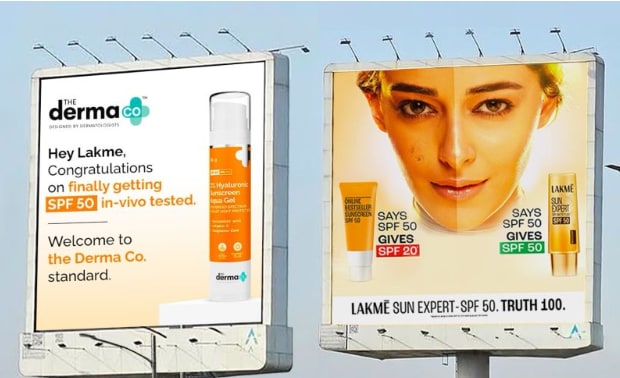On Thursday, a bench of the Delhi High Court heard a lawsuit filed by Honasa Consumer Limited against Hindustan Unilever Limited (HUL) concerning an allegedly disparaging sunscreen advertisement. Both parties agreed to resolve the matter amicably. HUL consented to modify the ad and remove it from both online platforms and out-of-home (OOH) placements.
Per the agreement reached in court, HUL will alter the advertisement by changing the product’s color to light yellow, ensuring it no longer resembles Honasa Consumer’s Derma Co. sunscreen. Additionally, the phrase “online bestseller” will be replaced with “some sellers.”
Attorneys for Honasa also requested that HUL withdraw its case against the brand in the Bombay High Court, to which both parties agreed.
Justice Amit Bansal noted that HUL would take down the online version of the advertisement by 24 hours, and all hoardings by both parties would be removed within 48 hours.
Senior Counsel Amit Sibal, representing Honasa — the parent company of Mamaearth — had urged the court to order immediate removal of the HUL advertisement from all platforms, including print, digital, OOH, and social media.
On April 16, Justice Bansal had remarked that, on its face, the ad appeared to be disparaging. At HUL’s request, the court granted a one-day extension for the company to file a formal response. HUL’s legal team also informed the court that it had filed a similar case against Honasa Consumer.
The court had stated: “The impugned advertisements by the defendants are clearly disparaging and misleading. Issue notice. Notice is accepted by the defendant’s counsel, who requests one day to obtain instructions. The evidence submitted relies on Division Bench judgments.”
Read More: Brand battles get personal: Why comparative advertising is having a moment
The controversy began when Lakmé, an HUL brand, launched a marketing campaign promoting its Lakmé Sun Expert SPF 50 sunscreen. The campaign introduced a dramatized concept called the “SPF Lie Detector Test,” which alleged that some “online bestsellers” significantly overstated their SPF protection. Although the ad did not explicitly name any brands, it featured two unbranded sunscreen bottles that closely resembled Mamaearth’s The Derma Co. and Nykaa’s Dot & Key products.
Lakmé claimed the campaign was grounded in in vivo testing — a globally recognized gold standard for sunscreen efficacy — conducted by an independent accredited lab. The company asserted that while its product met the SPF 50 standard, other tested sunscreens provided protection as low as SPF 20.
Mamaearth responded quickly. Co-founder Ghazal Alagh publicly accused Lakmé and HUL of copying not just Mamaearth’s sunscreen, but other products as well — including its vitamin C face wash and onion shampoo. In a now-deleted social media post, Alagh shared side-by-side comparisons and product launch timelines with the caption “OG vs Copy” to support her claim.
“India’s FMCG sector has lacked strong competition for a long time,” Alagh wrote in another post that remains online. “We take pride in challenging the status quo and consistently pushing legacy brands to do better.”
In an exclusive statement to Storyboard18, HUL defended its sunscreen and campaign, stating that all claims were supported by rigorous testing. “Since 2015, we’ve conducted in vivo SPF testing across our sun care portfolio,” said an HUL spokesperson. The company further alleged that several popular sunscreens have been “falsely claiming SPF 50.”
“In the interest of consumers, independent lab testing has shown that some of these products fall far short of their stated SPF claims,” the spokesperson added. “This misleads consumers and could lead to potential skin issues such as pigmentation, premature aging, and dark spots. Indian consumers deserve sunscreens they can trust.”
Read More: Delhi HC flags HUL’s Lakmé Ad as disparaging in Mamaearth lawsuit
